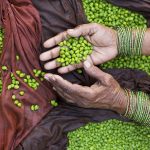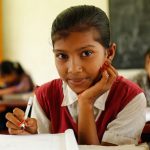The Working Group on Targeted Food Interventions, which was chaired by IFPRI, introduced the concept of the Food for Education program in August 1992, through which families were given food in exchange for their children’s continued attendance in school. This innovative idea was endorsed by the World Bank as a promising approach. In 1993, the Bangladeshi government introduced a pilot Food for Education program based on the recommendations from IFPRI and its partners. It used the savings accumulated from terminating the Palli Rationing Program for a more effectively targeted, food-based intervention.
Bangladesh
Despite improvements in agricultural production and improved child nutrition rates, Bangladesh continues to face persistent and emerging challenges such as worsening soil fertility, population growth, climate change, poverty, and access to natural resources. In the Government’s efforts to overcome these challenges, it has been working with IFPRI since the 1990s to develop evidence-based research on food aid, agricultural technology, gender dynamics in extension programs, nutritional interventions, and poverty reduction investments to inform policymakers.
In 2010, IFPRI, with the Government of Bangladesh Ministry of Agriculture and the United States Agency for International Development, initiated the Bangladesh Policy Research and Strategy Support Program—an innovative initiative designed to improve agriculture, and food and nutrition security that has led to research influencing the Government to adopted policies emphasizing strong food and nutrition security.
More on IFPRI’s impactful partnership with the Government of Bangladesh can be found in this brochure.
Improving Public Food Distribution in Bangladesh
In response to natural disasters and crop failures that caused food shortages in the 1990s and 2000s, the World Food Programme (WFP) and other donors supplied food for the Government of Bangladesh to distribute. However, with growing concerns that food aid was not reaching the most vulnerable, WFP called on IFPRI in 2003 to examine the source of food aid "leakages."
Leveraging Agriculture for Nutrition in South Asia (LANSA)
Agriculture is the primary livelihood for nearly half the population of South Asia, and yet its potential to reduce undernutrition remains unrealized. One-third of children in South Asia are stunted. Despite increasing political will to improve nutrition, evidence has been sparse on how agriculture and agrifood systems can be better designed to improve nutrition. In 2012, a research consortium called Leveraging Agriculture for Nutrition in South Asia (LANSA) was formed among the Collective on Social Science Research in Pakistan, BRAC, the Leverhulme Centre for Integrated Research on Agriculture and Health (LCIRAH), the Institute of Development Studies (IDS), and IFPRI, under the leadership of the M.S. Swaminathan Research Foundation and with support from UK's Department for International Development (DFID). The aim was to generate evidence to strengthen the nutrition sensitivity of agrifood systems in Afghanistan, Bangladesh, India, and Pakistan.
HarvestPlus: Addressing Nutritional Challenges through Zinc Rice
In Bangladesh, 41 percent of children under five are estimated to be zinc deficient according to the Bangladesh Demography Survey, and the country loses over US$700 million in gross domestic product due to vitamin and mineral deficiencies according to the World Bank. Faced with such deficiencies in nutrition and productivity, HarvestPlus, in partnership with the European Commission and the IFPRI-led CGIAR Research Program on Agriculture for Nutrition and Health (A4NH), worked closely with the Bangladesh Rice Research Institute (BRRI), the International Rice Research Institute, and 30 other partners to develop three rice varieties fortified with zinc.
Cereal Systems Initiative for South Asia (CSISA)
IFPRI leads the policy research component of the Cereal Systems Initiative for South Asia (CSISA), a regional effort designed to raise agricultural productivity and enhance farmers’ incomes. Between 2010 and 2015, more than one million farmers in Bangladesh benefited from higher yields because of stress-tolerant rice varieties distributed by CSISA.
Female Secondary School Assistance in Bangladesh
In 2004, IFPRI researchers assessed the impacts of the Female Secondary School Assistance Project (FSSAP). The project was enormously successful. In fact, girls significantly overtook boys in secondary school enrollment—a rare phenomenon in a developing country. Not only was the program effective at giving many girls from poor families the financial support they needed, but it also enhanced awareness of the value of female education among girl students.


